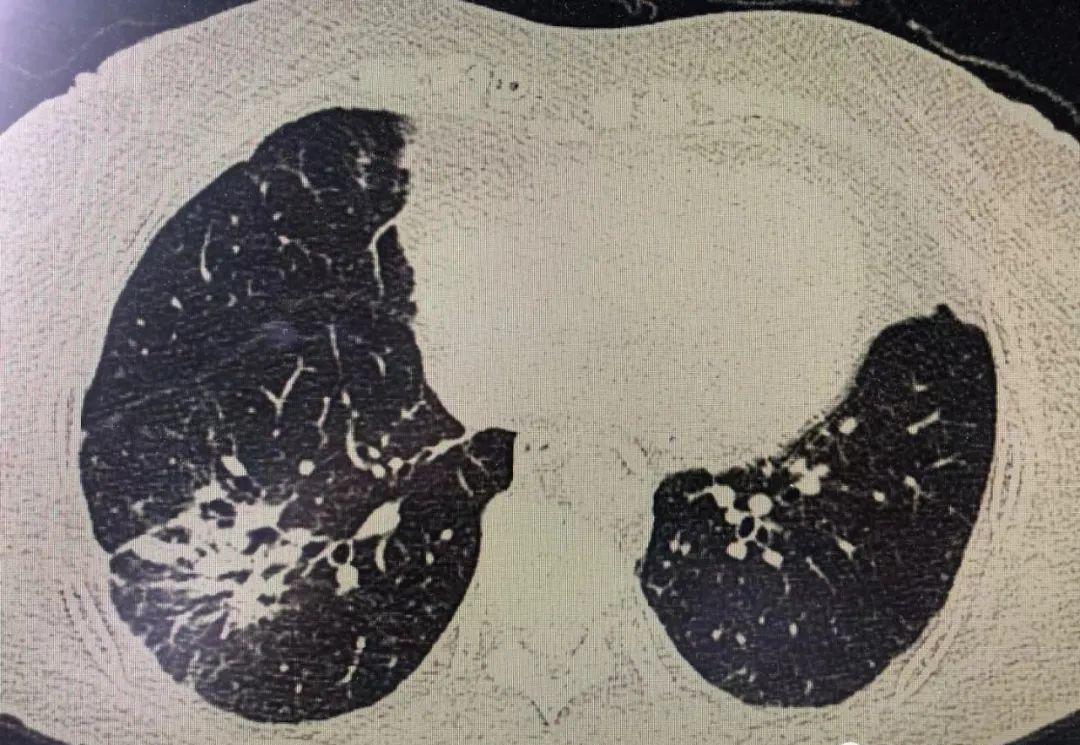There is an 86-year-old elderly female patient, let's call her Aunt Jiang. Aunt Jiang will undergo a physical examination at Hospital A every year, and after the physical examination at the end of May this year, the physical examination center of Hospital A called her and told her that a ground glass nodule with a diameter of about 1.2 cm appeared in her right lower lung, and suggested that she quickly come to the respiratory department or thoracic surgery department for examination. After the patient's daughter learned about this, she couldn't help but get anxious, the physical examination of lung CT a year ago was still reported to be normal, how could there be a lung nodule after a year? I heard that ground glass nodules often mean lung cancer, which paid off, hurry to the hospital.
Dr. A looked at the lung nodules and said that lung cancer was highly suspected from the morphological point of view.
Alas, lung cancer! It's horrible! Doctor, what should we do? Family members said anxiously.
Now the nodule is too small, the tracheoscopy can't do it, and the lung puncture is enough, Dr. A said.
So what to do? Can I have surgery? The family was furious.
We do not advocate surgery for patients over 80 years of age because the risks are high. Dr. A said helplessly.
What about conservative medical treatment? The family members are full of expectations.
Chemotherapy is not good, and the elderly will not be able to stand all kinds of adverse reactions. In particular, bone marrow suppression, chemotherapy drugs with white blood cells to fight, a variety of opportunistic infections will appear. This road is also not feasible. Dr. A continued.
Is there a chance of oral medication? I've heard that there is not a kind of targeted therapy. The family still asked persistently.
Targeted drugs to see the patient's genetic mutations, the current pathology has not been obtained, can not be detected. In addition, this early lung cancer does not need to use targeted drugs. Dr. A dismissed the family's third hope.
So what to do, can only wait for the lesion to grow bigger day by day? The family seemed a little desperate.
There is actually another way to consider. Dr. A said leisurely.
What else could I do to save my mother. The family asked urgently.
Radiation therapy, for this nodule, we use radiation to kill cancer cells. Dr. A said.
Great, so that my mother has been saved, then hurry up and treat my mother. The family members were overjoyed to catch a life-saving straw.
The treatment proceeded quickly, and after a month and a half of re-examination of the CT, Dr. A said to the patient and family: "Congratulations, the ground glass nodule of the right lower lung is gone, and the radiation therapy is successful." ”
That's great! Thank you doctor! The family members wept with joy.
However, there are some lesions here in the middle right, and some oozing shadows. Dr. A said.
What do you mean? What does this mean? The family is puzzled.
"It could be radiation pneumonia, which is a complication of radiation therapy. Radiation not only kills cancer cells, but can also damage normal cells and tissues. However, the elderly do not have any symptoms such as cough, shortness of breath, and fever. Indicate that the problem is not serious, you can observe. Dr. A said.
So the patient and his family went home happily.
However, after half a month, the patient had fever, cough, and felt short of breath after a few days, so he came to the nearby B Hospital, and the oozing shadow of the right middle lobe became larger, and a new oozing shadow also appeared in the lower right lobe. Dr. B combined the patient's treatment history, diagnosed radiation pneumonitis, gave the patient hormones, and did not rule out the use of antibiotics for possible infections. After a week, the patient's symptoms gradually improved.

In this case, there are several questions worth exploring:
(1) Is a ground glass nodule necessarily lung cancer? On the Internet and in the concept of many doctors, ground glass nodules are almost equivalent to lung cancer, so they should be actively treated, but for elderly patients, the treatment of ground glass nodules should be very careful, because any treatment may not cause less damage than the tumor itself. Moreover, in the absence of pathological evidence, ground glass nodules may also be infected, and a more secure way is to treat anti-infection first, rather than radiation therapy.
(2) What should we do if we have a high suspicion of lung cancer, but we do not have evidence of pathology? My advice is to wait patiently and not rush to treat immediately. Because the progression of ground glass nodules is usually very slow, and it may not be necessary to wait for the tumor to progress, the patient will die due to other diseases, so there is no need to treat the possible tumor.